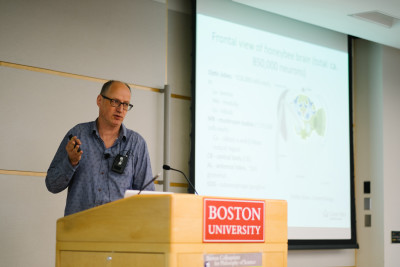
Scholars from across the country and abroad gathered in Boston University’s Photonics Center for an all-day conference Saturday titled “Convergent Minds: The Evolution of Cognitive Complexity,” where 11 speakers from various specialties related to philosophy and biology engaged in conversation about the evolution of consciousness in various animals.
The event was a part of a lecture series called the Boston Colloquium for Philosophy of Science, which was organized by BU’s Center for Philosophy and History of Science in the College of Arts and Sciences. Seeking to bridge the gap between the humanities and science, the Center encourages the study of science through an interdisciplinary viewpoint.
The Colloquium, created more than 50 years ago, is an annual lecture series that brings many of the world’s top philosophers, historians and scientists to talk about the fundamental principles of science. Saturday’s conference was the second event of the Colloquium’s annual program, and took a rather detailed and integrative look at consciousness’ convergent evolution.
Clive Wilkins, a speaker at the conference and an artist in residence at the University of Cambridge in the United Kingdom, offered his opinion on why consciousness needs to be discussed and studied.
“Thinking is a very complex thing,” Wilkins said. “Despite the fact that we’re a great civilization and a modern kind of species, we’re still asking very fundamental questions … Our understanding [of how the mind works] is very elementary.”
Nicola Clayton, a professor of comparative cognition at Cambridge who also holds a Ph.D. in psychology, collaborated with Wilkins on their joint lecture. At one point, Clayton emphasized the importance of having the conference discuss an interdisciplinary subject.
“It’s a combination of disciplines, primarily biologists, psychologists and philosophers,” Clayton said. “The way it’s being organized is that they’re asking questions about [the] convergent evolution of cognition and thinking.”
She then added, “They [the researchers] are asking, ‘To what extent do animals share similar traits with other different types of animals or a human being?’ It is all being combined with philosophers asking, ‘What exactly is a mind, what exactly is convergence [and] to what extent can we talk about convergence in minds?’”
While the conference was focused on the single theme of cognitive complexity, the talks were multifarious and looked at the same subject from many different perspectives. Speakers covered topics from consciousness in animals to the very definition of cognition.
Clayton and Wilkins held a joint lecture about mental time travel, looking at it from an interdisciplinary perspective. Combining their respective specialties in psychology and the arts, the two discussed the ability of individuals to think about their own past, present and future.
Another speaker, Kay Holekamp, a zoologist from Michigan State University, talked about a completely different subject. Holekamp’s research focused on working with mammalian carnivores and exploring the effects of social interactions on their intelligence.
“My talk is going to focus on about 20 years worth of work that we’ve done investigating initially [social] intelligence and later technical problem-solving in mammalian carnivores,” she said.
Even though each talk was different from each other, the conference stimulated a flow of ideas. This idea was reflected in the comments of Dan McShea, a professor at Duke University.
“The main idea of a conference like this is to get together a bunch of people with a shared interest … and get them talking to each other,” he said. “The talks are a kind of appetizer, a way of getting the conversation going. Once you gets academic talking casually and informally about their work, new ideas start to flow like maple syrup from a tree.”




